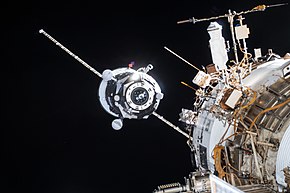Progress MS-08
 Progress MS-08 approaches the ISS on 15 February 2018 | |
| Names | Progress 69P |
|---|---|
| Mission type | ISS resupply |
| Operator | Roscosmos |
| COSPAR ID | 2018-019A |
| SATCAT no. | 43211 |
| Mission duration | 197 days |
| Spacecraft properties | |
| Spacecraft | Progress MS-08 s/n 438 |
| Spacecraft type | Progress-MS |
| Manufacturer | Energia |
| Launch mass | 7430 kg |
| Payload mass | 2494 kg |
| Start of mission | |
| Launch date | 13 February 2018, 08:13:33 UTC[1] |
| Rocket | Soyuz-2.1a (s/n U15000-030) |
| Launch site | Baikonur, Site 31/6 |
| Contractor | RKTs Progress |
| End of mission | |
| Disposal | Deorbited |
| Decay date | 30 August 2018 |
| Orbital parameters | |
| Reference system | Geocentric orbit |
| Regime | Low Earth orbit |
| Inclination | 51.67° |
| Docking with ISS | |
| Docking port | Zvezda |
| Docking date | 15 February 2018, 10:38 UTC |
| Undocking date | 23 August 2018, 02:16 UTC |
| Time docked | 188 days |
| Cargo | |
| Mass | 2494 kg |
| Pressurised | 1388 kg |
| Fuel | 640 kg |
| Gaseous | 46 kg |
| Water | 420 kg |
Progress MS-08 (Russian: Прогресс МC-08), identified by NASA as Progress 69P, was a Progress spaceflight, operated by Roscosmos to resupply the International Space Station (ISS).
History
[edit]The Progress-MS is an uncrewed freighter based on the Progress-M featuring improved avionics. This improved variant first launched on 21 December 2015. It has the following improvements:[2][3][4]
- New external compartment that enables it to deploy satellites. Each compartment can hold up to four launch containers. First time installed on Progress MS-03.
- Enhanced redundancy thanks to the addition of a backup system of electrical motors for the docking and sealing mechanism.
- Improved Micrometeoroid (MMOD) protection with additional panels in the cargo compartment.
- Luch Russian relay satellites link capabilities enable telemetry and control even when not in direct view of ground radio stations.
- GNSS autonomous navigation enables real time determination of the status vector and orbital parameters dispensing with the need of ground station orbit determination.
- Real time relative navigation thanks to direct radio data exchange capabilities with the space station.
- New digital radio that enables enhanced TV camera view for the docking operations.
- The Ukrainian Chezara Kvant-V on board radio system and antenna/feeder system has been replaced with a Unified Command Telemetry System (UCTS).
- Replacement of the Kurs A with Kurs NA digital system.
Launch
[edit]Progress MS-08 launched on 13 February 2018 from the Baikonur Cosmodrome in Kazakhstan atop a Soyuz-2.1a rocket, at 08:13:33 UTC.[1]
Docking
[edit]Progress MS-08 docked on 15 February 2018 with the aft docking port of the Zvezda module, at 10:38 UTC.[1][5]
Cargo
[edit]The Progress MS-08 spacecraft delivered 2,494 kg of cargo and supplies to the International Space Station. The following is a breakdown of cargo bound for the ISS:[3][5]
- Dry cargo: 1,390 kg
- Fuel: 890 kg
- Oxygen and Air: 46 kg
- Water: 430 kg
Progress MS-08 also includes two nanosatellites: Tanyusha YuZGU-3 (1998-067PJ) and Tanyusha YuZGU-4 (1998-067PK) (a.k.a. Radioskaf RS-8 and Radioskaf RS-9) with a mass of 2.5 kg, which was developed jointly by RKK Energia and students at the South-Western State University, YuZGU, in the city of Kursk. The satellites will be launched by spacewalking cosmonauts.
Undocking and decay
[edit]Undocking on 23 August 2018, at 02:16 UTC. And decay in the atmosphere and its debris entered the Pacific Ocean, on 30 August 2018.
References
[edit]- ^ a b c Chris Gebhardt; William Graham; Chris Bergin (15 February 2018). "Progress MS-08 docks with ISS". NASASpaceflight.com. Retrieved 15 February 2018.
- ^ Krebs, Gunter (1 December 2015). "Progress-MS 01-19". Gunter's Space Page. Retrieved 16 November 2018.
- ^ a b "Progress MS-08 2018-019A". NSSDCA. NASA. 13 February 2018. Retrieved 30 August 2018.
 This article incorporates text from this source, which is in the public domain.
This article incorporates text from this source, which is in the public domain.
- ^ Zak, Anatoly (13 February 2018). "Progress-MS". Russian Space Web. Retrieved 15 February 2018.
- ^ a b Zak, Anatoly (15 February 2018). "Progress MS-08 arrives at ISS". russianspaceweb.com. Russian Space Web. Retrieved 30 August 2018.


